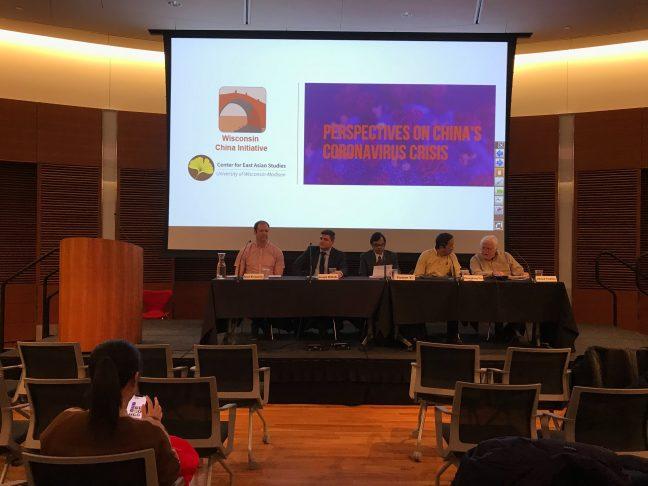The Wisconsin China Initiative and Center for East Asian Studies assembled a panel of experts to discuss the ongoing coronavirus epidemic, Monday night.
Opening the discussion, Professor of Biochemistry Robert Kirchdoerfer discussed the origin, biology and future treatment of the virus.
“Different mammalian species use very similar sets of [cell] machinery,” Kirchdoerfer said. “So if there’s a virus that can use the same machinery from those different species, that virus can jump from one species to another.”
UW-Madison research lab working on possible cure for coronavirus
Kirchdoerfer said the coronavirus likely originated in bats but didn’t spread to humans until it infected a second intermediate species. He said scientists still don’t know what the intermediate species for coronavirus is.
Kirchdoerfer said scientists are currently repurposing antivirals originally intended to treat HIV and RNA infections, but said he didn’t expect human trials to occur until April. Widespread production of the vaccine may not occur until the end of 2020.
Specialist in adult and pediatric infectious diseases Dr. Joseph McBride said the coronavirus spread so quickly because it might lie in the “sweet spot” of the disease spectrum.
If a disease is too deadly, McBride said, it will kill its victims before it can spread, but if the disease does not have enough symptoms it is not a threat.
McBride said because the coronavirus has a mortality rate of 1.4% and because it presents with a vague array of symptoms, the virus is in this “sweet spot.”
Expert in Chinese media Zhongdang Pan, University of Wisconsin senior Fuxian Yi and Political Science Professor Edward Friedman discussed China’s response to the coronavirus.
Pan said until Jan. 23, after Wuhan was quarantined, the Chinese government not only ignored the coronavirus’ threat but punished the scientists and doctors who raised the first alarm.
UPDATED: First confirmed coronavirus case in Wisconsin tested at UW Hospital
Pan said only after the disease began to rapidly spread out of control did the government begin addressing it. Even then, the government prioritized controlling the media narrative, which portrayed China as helping to save the world. In February the Chinese government published a book on President’s Xi Jinping’s efforts to fight the virus.
Yi said China’s political machine is the reason why the nation failed to contain the coronavirus. Yi said because interest groups influence government policies and the government censors media outlets, Chinese leadership cannot distinguish between truth and lies.
Friedman said he didn’t expect the current political powers to respond well to the coronavirus.
“I fear that we are heading into a direction of economic decoupling, deglobalization and increasing chauvinism,” Friedman said. “One can already see such forces in the story of this virus.”














